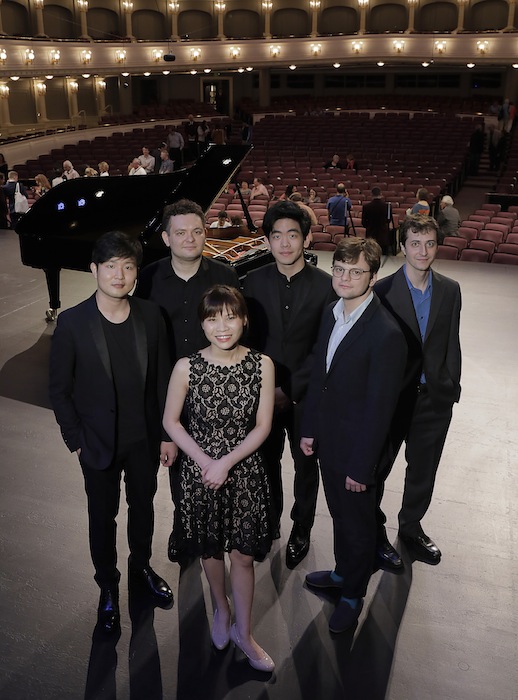How these six pianists made it to the Cliburn Competition finals

The six finalists of the 2017 Van Cliburn International Piano Competition (Left to right: Yekwon Sunwoo (South Korea), Yury Favorin (Russia), Rachel Cheung (Hong Kong), Daniel Hsu (United States) Georgy Tchaidze (Russia) and Kenneth Broberg (United States). Photo: Ralph Lauer
The Van Cliburn jury clearly opted for a wide range of style and schools in culling the group of twelve semifinalists to six finalists Monday night, producing what is likely to be a varied and eclectic set of final round performances.
The only obvious bias on the part of the jury was against semifinalists who were either unable to organize and then perform–without mental or physical fatigue–a meaningful, self-contained hour-long program. And/or against those who were inadequately prepared to meet the special challenges of performing the concertos of Mozart.
Rachel Cheung, who emerged as an audience favorite, used the semifinal round to demonstrate not only a high level of onstage charisma, but a range including Classical, romantic, and modern music demanding both muscle and intellect. Kenneth Broberg, a son of the American heartland, seemed to have a direct line to the middle European tradition, with a sure hand for Schubert and Liszt as well as Mozart. Georgy Tchaidze represented the Saint Petersburg school of Russian virtuosity, bringing a romantic sensibility and color to a repertoire of Mussorgsky, Medtner, and Schumann in his semifinal recital; Yury Favorin, representing the Moscow branch of the same tradition, amazingly linked works of Beethoven and Shostakovich in his semifinal recital, overlaying emotional depth and intellectual imagination with muscular virtuosity.
California-born, Curtis-trained Daniel Hsu’s strengths lie clearly in reliable workmanship in his performances of Schubert and Brahms, which he demonstrated in his solo recital, while South Korean Yekwon Sunwoo, who has passed through Julliard, Mannes, Curtis, and Hannover on his educational journeys, showed programing imagination and stamina by presenting formidable masterpieces of Beethoven and Prokofiev, next to delightfully shmaltzy but technically demanding salon music of Percy Grainger.